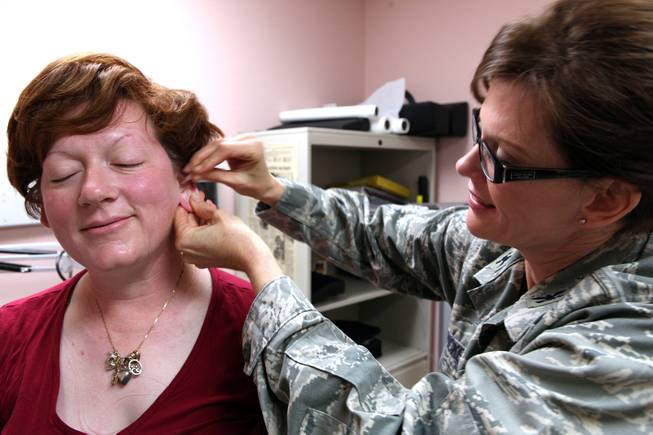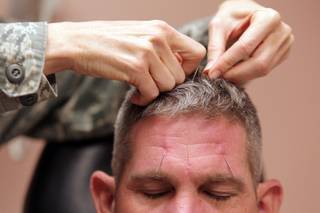
Lt. Col. (Dr.) Heather Pickett performs acupuncture therapy on Sandra Moncayo, a retired Naval Chief Petty Officer, at Mike O’Callaghan Federal Medical Center at Nellis Air Force Base in Las Vegas on Wednesday, May 15, 2013.
Friday, May 24, 2013 | 2 a.m.
Sandra Moncayo carries the pain with her everywhere she goes.
It starts in her head — a constant throbbing that feels as if her head is giving birth to her brain – and works its way down her spine, tying her neck, shoulders and back muscles into knots. Insomnia sets in, then nausea, and then anger.
The retired Navy chief petty officer suffers from a tumor in her brain. While radiology removed most of the tumor in 2007, an inoperable section remains wrapped around an artery in the brain. It is the source behind the pain — her constant companion.
She tried medication, but the pills made her a zombie. She tried to live with it, but the pain was too excruciating. Her faith told her there was a reason she was still alive, but she wondered how she would ever be able to function again in life and as a middle-aged mother to her six children.
Then her doctor recommended acupuncture. Moncayo leapt at the opportunity, desperate to try anything. When the first needles went in her ear, relief was instantaneous. She passed out in exhaustion. She became hooked.
Now Moncayo sits in a patient’s room for her regular acupuncture treatment at Mike O’Callaghan Federal Medical Center situated on Nellis Air Force Base on a mid-May morning. The military hospital has become an unlikely center where Eastern and Western medicine collide. It’s a place where military doctors combine the holistic practice of acupuncture with their medical expertise to treat pain for countless airmen and veterans — a practice that has become more commonplace in the military over the past eight years.
“The point of having a physician learning acupuncture in addition to the Western modalities we have now is that some look at it as another tool in the tool box,” said Dr. Heather Pickett, a colonel in the U.S. Air Force. “We are a bridge between where a lot of patients are going but Western medicine doesn’t recognize.”
Pickett strolls into the patient’s room where Moncayo is waiting for her regular acupuncture treatment and begins opening packets of needles — her toolbox. Each needle is the width of a strand of hair and about 2 inches long. Moncayo is Pickett’s second patient this morning, and she is getting the full treatment.
“I got my pain face going on,” Moncayo said.
“You do; I can see it in your eyes,” Pickett responds, recognizing Moncayo’s glazed over eyes that appear to be focused inward on her pounding headache.
Pickett has Moncayo lie down on her stomach and begins inserting needles in her scalp by placing her finger on the top of the needle and tapping it once. The skin grabs the needle, producing a sensation punctuated with an “ooh or ahh” from Moncayo. Pickett continues to place 25 needles into specified stimulation points around Moncayo’s neck, head and hands. She then hooks up a device that sends tiny electromagnetic pulses through the needles and adds an infrared lamp — completing a makeshift acupuncture spa. The treatment heightens the effects of the needles, which send an electrical energy toward her head to relieve the pain.
“Oh yeah, that feels nice,” Moncayo coos.
Pickett is responsible for bringing acupuncture to Nellis, in 2008. She had been practicing the procedure at an Air Force family hospital in St. Louis since 2004, after a high-ranking general discovered the healing benefits of the procedure firsthand.
Initially, Pickett was met with skepticism from doctors at the Nellis hospital and jaw-dropping surprise and hesitation from patients. Unlike the rigid rules and structure in place throughout the military, acupuncture is far from an exact science.
Her colleague at Nellis, Dr. Paul Crawford, also a lieutenant colonel, needed to experience the benefits firsthand before he believed the procedure worked. Pickett treated Crawford’s swollen hand with acupuncture, and within three hours, the swelling was gone. Eventually, the staff was won over by the results, as well.
“I was going to have to do steroids and not do pushups for about month, but after acupuncture I was doing pushups that day,” Crawford said.
No one knows specifically how acupuncture works, but Pickett explains the basic idea is that the needles affect the energy flow in the body, or “qi” (pronounced “chee”). When the body is in pain, that energy flow is disturbed and chemical or electrical balances might be off. The needles are placed in specified stimulation points identified in ancient China, and they release natural electricity that allows the body to heal itself.
The procedure can help treat and sometimes heal myriad conditions, from post-traumatic stress disorder to headaches, allergies to sprains and fractures.
“Sometimes when you have a patient so off or out of balance because of chronic pain or chronic issues, I explain to them that acupuncture is like rebooting their system,” Pickett said.
The practice has become popular throughout the military for its ability to get patients back to duty quickly. Where pills or surgery might put a soldier out of duty, acupuncture treats the pain without side effects.
During the Afghanistan War, the military used acupuncture to treat soldiers for strains or stress. Demand is so huge, Pickett said she treats about five patients a week. Doctors at the Nellis hospital are now trained to do a basic acupuncture ear technique as another tool to relieve pain.
“I rarely run into anyone surprised now,” Crawford said. “It’s pretty much the norm that they have that treatment available to them.”
For veterans in Las Vegas, the military-provided treatment has provided them ease of mind. Paul Kelly, a former Army staff sergeant, said he receives multiple treatments each month at the hospital.
He served seven years in the Amy and two tours before he was medically discharged. A crush injury to his ankle damaged nerves in his leg, leading to multiple surgeries. He also suffers from PTSD.
Pain and depression haunt him everywhere he goes, but the acupuncture treatment helps him manage the pain and live his life. If the military hadn’t offered the treatment, he would never have considered it otherwise and might never have found a way to control the pain.
“The treatment I’ve had here at the hospital — for a wounded warrior that’s been medevaced, you feel like you’re lost in the system — the people here have just been incredible. They have knocked down walls to take care of me,” Kelly said. “I feel like I owe these people a dinner, and if I had the money, I’d do it.”
For Moncayo, the relief provided by acupuncture is immeasurable. After her acupuncture treatment that mid-May morning, her face exuded a warmth and energy that wasn’t there earlier.
“I absolutely love it; it’s fantastic,” Moncayo said. “I tell everybody I possibly can to do acupuncture.”
Her pain has been reduced to a one, like a small bruise being poked, she said. The pain will always haunt her, but thanks to the hospital’s acupuncture treatments, it will never control her life again.
CORRECTION: This story incorrectly identified Dr. Heather Picket as a lieutenant colonel in the U.S. Air Force. The story has been corrected to reflect her accurate rank of colonel. | (June 21, 2013)


Join the Discussion:
Check this out for a full explanation of our conversion to the LiveFyre commenting system and instructions on how to sign up for an account.
Full comments policy